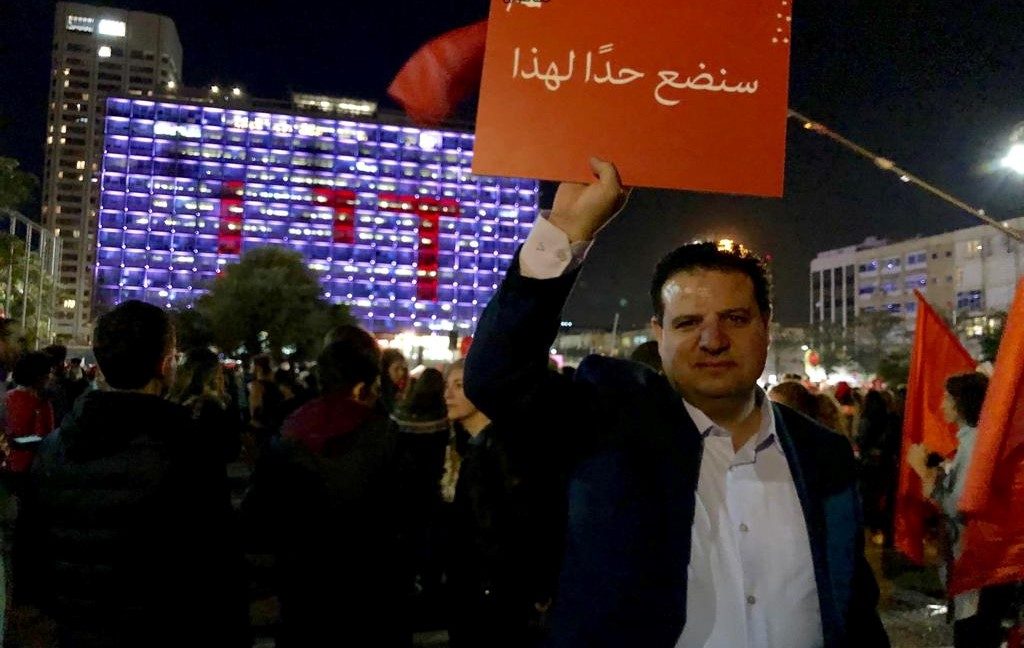Hadash lawmaker Ayman Odeh appealed on Tuesday, March 12, the decision of Israel the Justice Ministry to close the case into the assault against him by police officers during a protest against the planned eviction of the Arab-Bedouin community of Umm al-Hiran in January 2017. The Justice Ministry unit that investigates police misconduct closed the case, with the approval of State Prosecutor Shai Nitzan, last September.

MK Ayman Odeh during a demonstration against the murder of women in Tel-Aviv, December 4, 2018; the sign he holds aloft reads: “We will put an end to this.” (Photo: Zu Haderech)
The assault against Odeh occurred at Umm al-Hiran, following an incident in which the police shot to death a Palestinian citizen of Israel, schoolteacher Yacoub Mousa Abu al-Qee’an, 47, after he allegedly rammed his car intentionally into a group of police officers, killing one of them, Sergeant Major Erez Levy, 34.
Odeh and others were trying to reach the scene of the shooting and, in a video shot by an Al-Jazeera journalist, a cop is seen pepper-spraying Odeh. Odeh claimed that police officers then fired sponge-tipped bullets at his group, one of which hit him in the head, for which he require hospital treatment.
A law enforcement source told Haaretz last July that the investigation was characterized by foot-dragging. The police officers who fired sponge-tipped bullets were only questioned five months after the incident. The use of pepper spray was only investigated after another five months. The Justice Ministry questioned 10 police officers under caution.
The case alleging that the Odeh, was pepper sprayed by police was closed due to “lack of guilt”, meaning investigators concluded no crime was committed; the second case in which Odeh claimed he was hit in the head and injured by a sponge-tipped bullet was closed for a lack of evidence.
While Odeh maintains his head injury came from a sponge-tipped bullet fired by police, the police claimed he was hit in the head by a rock thrown by protesters at police which hit Odeh instead.
Over 20 police officers were questioned in the case. A number of them, including an officer with the rank of superintendent, were suspected of obstructing the investigation after they provided other police officers with information on the case before the latter were questioned. These matters were referred to the police’s internal disciplinary department.
According to a report by Zu Haderech, the Communist, Hebrew-language weekly, the cop suspected of shooting Odeh with a sponge-tipped bullet told his interrogators that he had fired four of the bullets, but none at the lawmaker.
Odeh’s appeal against the closing of the case contends that the identity of the shooter could have been determined if the unit had asked the questioned police officers relevant questions, adding: “Alternatively, the investigative materials indicate a single specific shooter, G., who fired towards a crowd. There is no alternative but to conclude that G. was the specific shooter and, therefore, should be put on trial.” Odeh’s appeal maintains that, according to the investigative materials, G. used sponge-tipped bullets during the incident but did not report having done so.
Upon questioning, G. admitted to having fired towards “the person leading the people.” Odeh’s lawyers, Public Committee against Torture in Israel attorneys Noa Levy, Shlomi Zecharia and Michal Ziv, argue that firing sponge-tipped bullets into a crowd is prohibited by law. G. said the situation was “messy” and that people should not have come into the “sterile area,” claiming they fired to deter the crowd.
After he submitted his appeal, Odeh said that the closing of the case demonstrates “whitewashing” by the investigating Justice Ministry unit. “Policeman used violence against a Knesset member and were not put on trial,” he stated. “Time and again the unit ignored the evidence presented in their investigation. They dragged the case out for over a year and ultimately decided to close it for political reasons.”
Related:
- Arab-Bedouin, Policeman Killed in Umm al-Hiran, MK Odeh Injured
- MK Odeh Demands Independent Inquiry into Umm al-Hiran Death
- Probe into Umm al-Hiran Killing Closed: Consent to Police Violence
- Top Prosecutor Shuts Case vs Cops Who Killed Man in Umm al-Hiran
- Case Closed against Police Officers Suspected of Injuring Hadash MK Ayman Odeh at Umm al-Hiran


